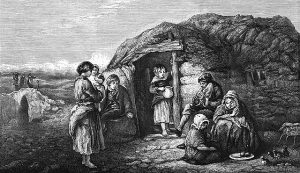Developing a deeper understanding of relatives can be quite important in tracing their movements. For example, if you own land then you are likely to stay in one place. If you are a tenant then moving is easier. Indeed, you may be given no choice by the landlord. Many tenant farmers were evicted when their crops failed. Without a crop to sell, you cannot pay the rent.
A poor education will severely restrict your employment opportunities. Brides and grooms that both made their marks on marriage certificates (thus demonstrating an inability to write their names) would not have been teaching their children literacy skills. They would not have been reading bed time stories, even assuming that they had access to any books. Even children who showed some potential at school were often forced out of education and into employment to help balance the family budget. (There has always been a ‘cost of living’ crisis for some people.) The sons and daughters of factory workers often became factory workers themselves, usually in the same factory. Agricultural labourers begat agricultural labourers. Careers advisors were not required in primary schools!
What sort of houses did my relatives call home? If you are lucky, there are maps showing the roads where your ancestors lived. If not, other clues can be used to give a general idea of dwellings in the neighbourhood. The sheer number of people recorded at single addresses leaves me wondering just how they all managed to find somewhere to sleep. The image of a sardine can comes to mind.
What did our ancestors eat? For once, this question is easier to answer for those of us with some antecedents from Ireland rather than for other realms. They ate a lot of potatoes. A working man could eat 10lbs of potatoes a day. No fancy cereals high in sugar and salt with lurid advertising on the packet. No marmalade or boiled eggs. No ‘five a day’. No convenience food from the freezer. Certainly, no home delivery services or take aways. Just potatoes and yet more potatoes, with some watered down milk. Other crops were grown in Ireland, but these were mainly exported to England, thus generating substantial profits for the landlords. Potatoes generate a lot of calories per acre, hence the popularity of the crop. All is well until that single crop fails, with catastrophic consequences.

There are enough early photos in existence for a good idea to be gained about what different classes of people wore. The fashion industry was not particularly prominent in the eighteenth or early nineteenth centuries. Changes were gradual. It was more a case of ‘this decade’s fashion’ and not ‘this season’s fashion’. My father passed down stories of his father ‘running around Ireland with no shoes on.’ I used to have my doubts about the truth of this fact. I have subsequently discovered many pictures of school children in rural Ireland without shoes. In some cases, none of the children have shoes. Clothes were passed down. Boys were dressed the same as girls until they were ‘breached’, at some indeterminate age. Clothes were repaired endlessly. The attraction of joining the Army starts to become apparent. They give you a decent pair of boots and a uniform. You were well fed. (In just 43 days in 1902, my grandfather put on 8 pounds of weight and increased his chest measurement by 3 inches.) You also had a bed to yourself, quite possibly for the first time in your life.
I would like to know how people entertained themselves. I imagine that story telling played a large part. For families that had moved far from their roots there would have been tales of ‘the old country’. No doubt these would incorporate a fair amount of exaggeration. Singing does not require any equipment. It is also a good way of providing reassurance to children afraid of the dark. Farm labourers’ cottages and factory workers back-to-back houses would have been poorly lit.
It is easy to create a picture of life for poor people two or three hundred years ago (i.e. the vast majority of the population) that looks unremittingly grim. But that is to judge by the standards and expectations of today.
